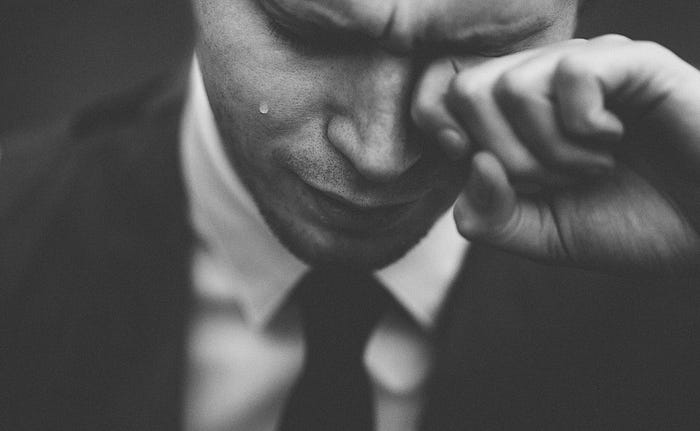As a teenage EMT during my college days, I vividly recall hearing the loud sound of my pager at 4AM waking me up from a dead sleep — responding to an automobile accident or someone having a heart attack. Barely awake, I’d grab my keys and drive as fast as I could to the Rescue Squad building, knowing full well that by the time I got back from the emergency, I’d have no time to sleep — not a good recipe for an engineering school student.

Those sleepless nights responding to emergencies taught me something incredibly profound about suffering that I’ve carried through my adult life: that our relationship with pain often matters more than the pain itself.
In this article, I’ll explore how the ego — that well-meaning but misguided protector — can turn necessary pain into unnecessary suffering. And how we can begin to reframe our difficulties not as punishments to endure, but as doorways to wisdom.
What if the very thing we resist… is actually our greatest teacher?
Far too often, we ask: “Why must we suffer?” Or even, “Why must we suffer for so long?”
Do we ever ask, “What lesson am I to learn from this?”. Or better yet, how many actually say, “Wow, this is great that I’m suffering!”. Crazy, huh? And through this article, I’m going to offer a different perspective that may shift your interpretation of suffering to more of a gift than a burden. Let’s reframe how we look at suffering through a few different lenses:
Perspective: It reminds us of how precious our human existence is and how we often forget how good most things really are — It’s like the Greek saying
“The man complained about his feet hurting until he saw someone with no legs”
Resolve and Faith: Having faith, in spite of suffering, builds an even stronger bond/connection with the divine. When you believe that your path will involve suffering, it then becomes your attitude and understanding of the interconnectedness of things that helps you integrate and understand the process of suffering and what lessons it has to teach us.
A better understanding of the Ego / Lower Self: The emotional and mental effects of suffering are exacerbated by the ego because it personalizes pain, resists surrender, and attaches meaning to suffering in a way that actually intensifies it. Let’s dive into this a bit more:
A bit more about the Ego and its Narratives:
The ego — it’s that persistent, uninvited guest in your mental space, whispering doubts, fears, and endless “what-ifs.” At its core, the ego evolved to protect us, keeping us safe in a complex world. But like an overzealous bodyguard, it doesn’t always know when to step back. Instead, it takes charge, often at the expense of peace, creativity, and authentic living.
Think of the ego as an overprotective friend who tries to help but ends up turning everything into a soap opera. Its intentions may be good, but its execution? Not so much. These may sound familiar — here are some of the ego’s greatest hits:
“I’m a victim and this always happens to me”
The ego/lower-self dives so deep into the suffering that it makes it part of its self-narrative. Instead of seeing pain as a passing experience, the ego proclaims, “I’m a victim” or “this always happens to me”, reinforcing suffering as an identity rather than an experience.
“Resisting Suffering”
The ego also tries to resist suffering as much as possible because it hates surrender. In fact, in trying to control what is uncontrollable, it leads to frustration and hence prolonged suffering. The more you resist reality, the more intense suffering becomes.
“Why Me”
The ego will compare your state of misery to your previous state OR to others’ and not-so-gently remind you “Why me and not them?” or “This isn’t fair”. It also judges whether the experience is good or bad — this makes it even more difficult to move on and move through the suffering.
“The Storyteller”
The ego gets a Pulitzer Prize for storytelling. “If I had only done things differently” or “I shouldn’t have to go through this by myself”. While seeking help or consolation is healthy, when it turns into calls for sympathy, it may actually help perpetuate the pain.
“I’m not going anywhere”
And here’s the kicker. When you finally get to the realization of the involvement of the ego in suffering, the ego starts to fear dissolving. It cannot imagine not existing — the ego panics for its survival by intensifying suffering rather than allowing itself to take a back seat and let the higher-self run the show.
“Suffering is the way the ego reminds you it exists”
The Hidden Gifts of Suffering
The irony? Suffering can be a doorway and path to freedom when it’s no longer seen through the eyes of the ego. When we start to dissolve the ego, suffering can then lead to wisdom, self-love, and inner peace.
Just as I learned during those sleepless nights as an EMT, suffering pushed me beyond my perceived limits. It taught me that what seemed unbearable in the moment actually created space for growth I couldn’t have imagined. The question isn’t whether we’ll suffer, but how we’ll respond when we do.
Ask yourself: What suffering am I experiencing right now that might actually be my doorway to greater wisdom? Perhaps the first step is simply recognizing when your ego has seized the narrative — because only then can you begin to gently loosen its grip. Perhaps if we change the way we look at suffering and ask ourselves, “What lesson is this suffering trying to teach me?”, we might begin to see suffering more as a gift rather than a burden.
Looking back in History
Another useful practice I find is to write down the last 2–3 times I have suffered in the past and recall:
- How it finally resolved
- What lessons I learned
- Was my reaction to it healthy
If you don’t keep a journal, this retrospective processing can be powerful in seeing how things played out against your greatest fears.
Suffering does not have to be a punishment
It can be more of an invitation.
It is a catalyst to help us grow and surrender so that we can see beyond what the ego wants or allows us to see. Shift the question from “Why am I suffering” to “What is this trying to teach me”, thus allowing suffering to be a teacher and guide rather than a punishment, guiding us towards resilience, wisdom, and a far deeper connection to the divine.

Just as I eventually came to see those 4AM emergency calls as more than just sleep deprivation — but rather as profound moments of human connection and growth — our suffering often reveals its purpose only in retrospect. So the next time you find yourself in a trench of suffering, pause.
Instead of resisting, take a breath, and ask —
What if this is a doorway to something greater?
Step through.
You might just be surprised by what you find.
If you enjoyed this insight, consider following me on Medium for more stories on personal growth


